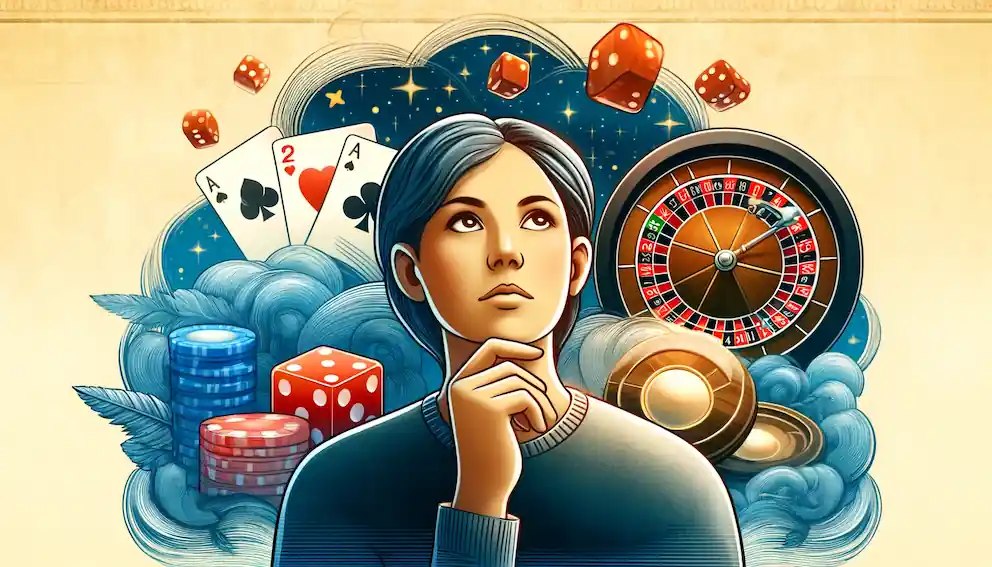Is Gambling a Sin: different cultures and religions described
Gambling has been a topic of moral, ethical, and legal debates for centuries. The question “is gambling a sin” delves deep into cultural, religious, and societal norms and beliefs. Various cultures and religions have different perspectives on gambling, often viewing it through the lens of their unique moral frameworks.
This article on MonkeyGambles.com explores the concept of gambling as a sin, its perception in different cultures and religions, the reasons behind these beliefs, and the positive aspects of gambling, including its economic and entertainment value.
Table of Contents
The Religious and Cultural Perspective on Gambling as a Sin
Christianity
In Christianity, views on gambling vary among different denominations and cultures. Generally, many Christian groups consider gambling to be a sin because it is associated with greed, covetousness, and the desire for easy money, which contradicts the Biblical teachings of hard work and stewardship.
Biblical References: The Bible does not explicitly mention gambling, but several verses are often interpreted to discourage it. For example:
- 1 Timothy 6:10: “For the love of money is a root of all kinds of evil.”
- Proverbs 13:11: “Wealth gained hastily will dwindle, but whoever gathers little by little will increase it.”
- Proverbs 28:20: “A faithful man will abound with blessings, but whoever hastens to be rich will not go unpunished.”
Denominational Views:
- Catholic Church: While the Catholic Church does not outrightly condemn gambling, it emphasizes moderation and warns against the potential for addiction and exploitation. The Catechism of the Catholic Church states that games of chance or wagers are not in themselves contrary to justice, but they become morally unacceptable when they deprive someone of what is necessary to provide for their needs and those of others.
- Protestant Denominations: Many Protestant denominations, such as the Southern Baptist Convention, explicitly oppose gambling. They argue that gambling undermines the work ethic, leads to social problems, and is a poor stewardship of God’s resources.

Islam
In Islam, gambling is unequivocally considered a sin. The Quran explicitly forbids gambling, associating it with immorality and idolatry.
Quranic References:
- Surah Al-Baqarah 2:219: “They ask you about wine and gambling. Say, ‘In them is great sin and [yet, some] benefit for people. But their sin is greater than their benefit.'”
- Surah Al-Ma’idah 5:90: “O you who have believed, indeed, intoxicants, gambling, [sacrificing on] stone alters [to other than Allah], and divining arrows are but defilement from the work of Satan, so avoid it that you may be successful.”
Hadiths: Various Hadiths also condemn gambling, reinforcing the notion that it leads to social and moral decay.
Hinduism
Hinduism presents a more nuanced view of gambling, influenced by historical and cultural contexts. Ancient Hindu scriptures like the Mahabharata and the Manusmriti mention gambling, often highlighting its destructive consequences.
Scriptural References:
- Mahabharata: The epic narrates the story of Yudhishthira, who loses his kingdom, brothers, and wife in a game of dice, illustrating the dangers of gambling.
- Manusmriti 9.221: “Gamblers and those who bet on them, [and] likewise betting on animals, should be compelled by the king to pay a fine.”
Hinduism does not categorically ban gambling but warns against its potential for addiction and moral degradation.
Buddhism
Buddhism generally views gambling negatively, associating it with greed and craving, which are considered obstacles to spiritual development.
Scriptural References:
- Sigalovada Sutta (Digha Nikaya 31): In this discourse, the Buddha lists six disadvantages of gambling, including loss of wealth, increased enmity, and the development of bad habits.
Buddhism emphasizes mindfulness and the Middle Way, advocating for a balanced approach to life that avoids extremes, including the pursuit of wealth through gambling.
Judaism
Judaism has a diverse perspective on gambling, with traditional Jewish law (Halacha) generally discouraging it. Gambling is often seen as a form of theft or deceit because it involves taking money without providing a fair service or product in return.
Talmudic References:
- Talmud Sanhedrin 24b: Describes professional gamblers as untrustworthy and unfit to serve as witnesses in Jewish courts.
- Mishnah Avot 3:17: “If there is no Torah, there is no worldly occupation; if there is no worldly occupation, there is no Torah.”
Jewish teachings emphasize honest work and ethical business practices, viewing gambling as contrary to these principles.
Why People Think Gambling is a Sin
Moral and Ethical Concerns
- Greed and Covetousness: Many religious and moral frameworks view gambling as driven by greed and the desire for quick, unearned wealth. This pursuit of easy money is seen as corrupting and contrary to the virtues of hard work and honest living.
- Addiction and Social Harm: Gambling addiction can lead to severe personal and social consequences, including financial ruin, broken families, and increased crime rates. The potential for addiction and the associated harms contribute to the perception of gambling as a sin.
- Exploitation and Inequality: Critics argue that gambling exploits vulnerable individuals, often those with lower incomes, by promising them wealth that is statistically improbable. This exploitation is seen as unethical and unjust.
- Dishonesty and Deception: Gambling can involve deceit and dishonesty, particularly in contexts where games are rigged or manipulated. This lack of transparency and fairness further taints the moral standing of gambling.
Religious Doctrines and Teachings
Religious teachings often explicitly condemn gambling due to its association with morally negative behaviors and its potential to lead individuals away from spiritual and ethical living. The specific doctrinal reasons vary among religions but commonly include concerns about:
- Idolatry: In Islam, gambling is associated with idolatry and impurity.
- Misuse of Resources: Christianity and Judaism often emphasize stewardship of resources, viewing gambling as a wasteful misuse.
- Hindrance to Spiritual Growth: Buddhism and Hinduism highlight the distractions and cravings that gambling fosters, which hinder spiritual development.

Positive Aspects of Gambling
Despite the negative connotations and potential harms, gambling also has positive aspects that can be beneficial when approached responsibly and in moderation.
Economic Benefits
Job Creation
Gambling establishments, such as casinos and racetracks, create numerous jobs. These range from direct employment opportunities like dealers, servers, and security personnel to indirect jobs in hospitality, retail, and entertainment sectors. For instance, the American Gaming Association reports that the U.S. casino industry supports over 1.8 million jobs.
Tax Revenue
Legal gambling generates significant tax revenue for governments. These funds are often used to support public services such as education, infrastructure, and healthcare. For example, in 2020, the commercial casino industry in the United States generated $41.7 billion in gaming revenue, contributing substantial tax revenue to state and local governments.
Entertainment Value
Gambling can be a form of entertainment, providing excitement and social interaction. When enjoyed in moderation, it can be a legitimate recreational activity.
Social Interaction
Casinos, poker rooms, and other gambling venues offer opportunities for socializing. They provide environments where people can gather, play games, and enjoy time together. Online gambling platforms also offer social features, such as chat rooms and tournaments, fostering a sense of community among players.
Thrill and Excitement
The uncertainty and risk involved in gambling create a thrill that many people find enjoyable. This excitement can enhance the entertainment value of gambling, making it a popular pastime for many.
You may also like: Is Online Poker Legal in Texas?
Cultural and Historical Significance
Gambling has been a part of human culture for centuries, with historical and cultural significance in many societies.
Historical Games
Games of chance have been played throughout history in various cultures, often as part of rituals, festivals, and social gatherings. The history of gambling is rich and diverse, reflecting the cultural importance of games and competition.
Modern Cultural Impact
Today, gambling is embedded in popular culture, with references in movies, literature, and media. It reflects broader cultural themes of risk, reward, and the human desire for fortune.
Responsible Gambling
The concept of responsible gambling emphasizes moderation and awareness, promoting a healthy approach to gambling that minimizes risks and maximizes enjoyment.
Education and Awareness
Many organizations and governments promote responsible gambling through education and awareness campaigns. These initiatives aim to inform the public about the risks of gambling and provide strategies for maintaining control.
Support Services
Support services, such as hotlines, counseling, and self-exclusion programs, help individuals who struggle with gambling addiction. These resources provide the necessary support to manage gambling behaviors and prevent harm.

Legal and Regulatory Aspects of Gambling
The legal status of gambling varies widely across different jurisdictions, with regulations designed to control and monitor gambling activities.
United States
In the United States, gambling laws are complex, with federal, state, and local regulations. The legality of various forms of gambling, including online gambling, differs by state.
Federal Laws
- Unlawful Internet Gambling Enforcement Act (UIGEA): Enacted in 2006, UIGEA prohibits online gambling businesses from accepting payments related to unlawful internet gambling. It does not, however, criminalize the act of online gambling by individuals.
- Indian Gaming Regulatory Act (IGRA): Passed in 1988, IGRA regulates gambling activities on Native American lands, allowing tribes to operate casinos under certain conditions.
State Laws
States have the authority to regulate gambling within their borders. Some states, like Nevada and New Jersey, have well-established gambling industries, while others have stricter regulations or outright bans. The legalization and regulation of sports betting and online gambling are evolving, with more states exploring these options.
Europe
European countries have diverse approaches to gambling regulation, with many having well-established legal frameworks.
United Kingdom
The UK Gambling Commission regulates all forms of gambling in the UK, ensuring fair play and protecting consumers. The UK has a comprehensive approach to gambling regulation, covering online and land-based activities.
Germany
Germany has a federal system with varying regulations across its states. The Interstate Treaty on Gambling aims to harmonize regulations, with a focus on player protection and combating illegal gambling.
Asia
Gambling regulations in Asia vary widely, reflecting the diverse legal and cultural landscape of the region.
China
China has strict gambling laws, with most forms of gambling being illegal. The exceptions are state-run lotteries and special administrative regions like Macau, where gambling is a significant industry.
India
India has a mix of federal and state regulations, with some states allowing certain forms of gambling and others imposing strict bans. Online gambling is a gray area, with ongoing legal debates and varying enforcement.
FAQ
1. What do major religions say about gambling being a sin?
Major religions have varying views on gambling. Christianity and Islam often consider it sinful due to associations with greed and addiction, while Hinduism and Buddhism typically warn against it due to its potential for moral and social harm.
2. Why do some people consider gambling a sin?
Some people consider gambling a sin because it is associated with greed, addiction, exploitation of vulnerable individuals, and the pursuit of easy, unearned money, which contradicts the values of hard work and ethical living.
3. Are there any positive aspects of gambling that might counter the belief that it is a sin?
Yes, gambling can have positive aspects such as generating economic benefits, creating jobs, and providing entertainment. When practiced responsibly and in moderation, it can be a legitimate form of recreation.
4. How do different cultures view gambling?
Cultural views on gambling vary widely; some cultures see it as an acceptable form of entertainment, while others view it with suspicion or moral disapproval. For instance, many Western societies regulate and accept gambling, whereas many Asian cultures have stricter prohibitions.
5. Can gambling ever be considered morally acceptable?
Gambling can be considered morally acceptable if it is done responsibly, in moderation, and without causing harm to oneself or others. The key is maintaining control and ensuring it does not lead to addiction or financial ruin.
Related article: How to Play Online Poker?

Conclusion
The question “is gambling a sin” cannot be answered definitively, as it depends on cultural, religious, and individual perspectives. Different cultures and religions have their own beliefs about gambling, often viewing it as a sin due to moral, ethical, and social concerns. These concerns include greed, addiction, exploitation, and moral degradation.
However, gambling also has positive aspects, including economic benefits, job creation, and entertainment value. When approached responsibly and in moderation, gambling can be a legitimate recreational activity that provides excitement and social interaction.
Legal and regulatory frameworks play a crucial role in controlling and monitoring gambling activities, ensuring consumer protection, and addressing potential harms. The evolving landscape of gambling regulation reflects the ongoing debates and diverse approaches to balancing the benefits and risks of gambling.
Ultimately, the perception of gambling as a sin or a permissible activity depends on individual values, cultural norms, and the broader societal context.
By understanding these perspectives and promoting responsible gambling practices, we can navigate the complexities of gambling and appreciate its multifaceted nature.
I hope you liked article of mine “Is Gambling a Sin” and find it useful.

